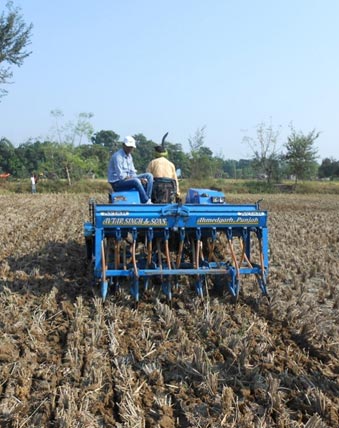
Why ITC Promotes 'Zero Till Farming' Zero Till Farming - Nurturing soil health, preventing air pollution
In North and Eastern India, traditionally, farmers cultivate wheat in rabi season after the paddy harvest. Post paddy harvesting, farmers undertake 2 - 3 tillage operations and burn paddy stubbles to clear the field. This usually takes 15 - 20 days before wheat can be sown. The burning of crop stubble adds to loss of organic matter, a valuable component for maintaining soil health and also adds to air pollution.
Both these challenges can be addressed with 'Zero Till Farming'. Zero Till is a method to grow crops each year without disturbing the soil through tillage or plowing. In this method, the previous crop residues are distributed evenly and left on the soil surface and no implements are used to turn the soil over or incorporate crop residues. This helps in nurturing the soil health and since it eliminates burning of crop stubbles, it saves the environment.
In a push to make farming sustainable and facilitate timely sowing, ITC is actively promoting 'Zero Till Farming' in the major wheat growing states of Uttar Pradesh, Bihar and West Bengal. A zero till machine is used to sow wheat seed directly in paddy harvested fields. Zero tillage has multiple benefits:
- Deployment of trained agri extension experts in guiding farmers on crop production practices.
- Introduction of contemporary farm technologies and practices to reduce cost and increase productivity & quality.
- Maintains soil health with soil moisture conservation by reduction in soil erosion and fertilizer usage.
- Reduces air pollution by eliminating paddy stubble burning
- Reduces tractor fuel consumption.
- Reduces water usage by 20%
- Saves cost of Rs.2600/ Acre as it eliminates land preparation, pre-sowing irrigation and fertilizers
- Improves productivity by 10 - 15%
Started with 8,000 acres during 2014, currently 61,000 acres have been covered under the Zero Till Farming programme promoted by ITC.